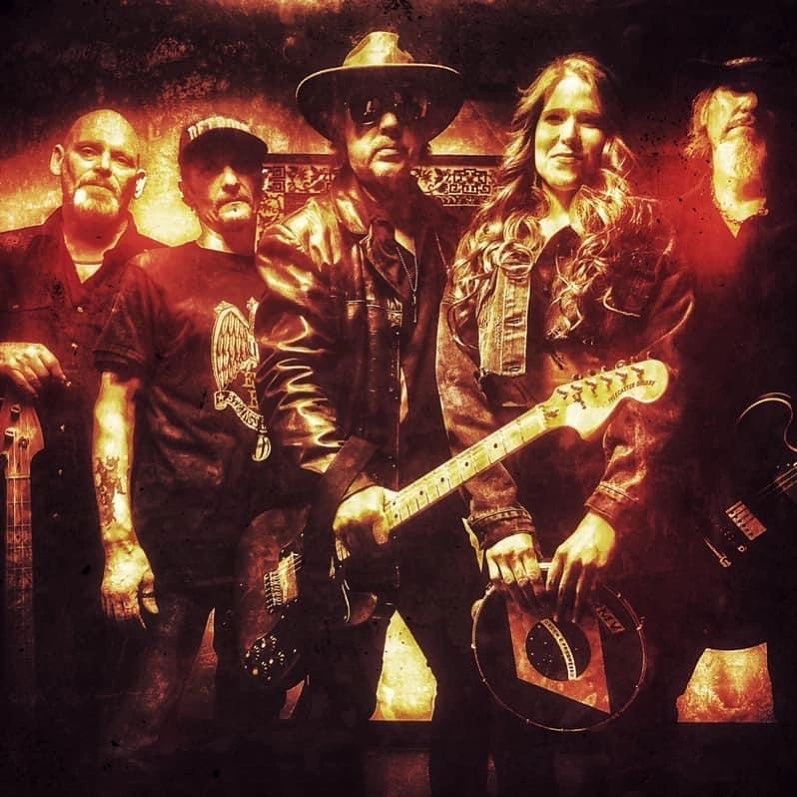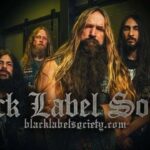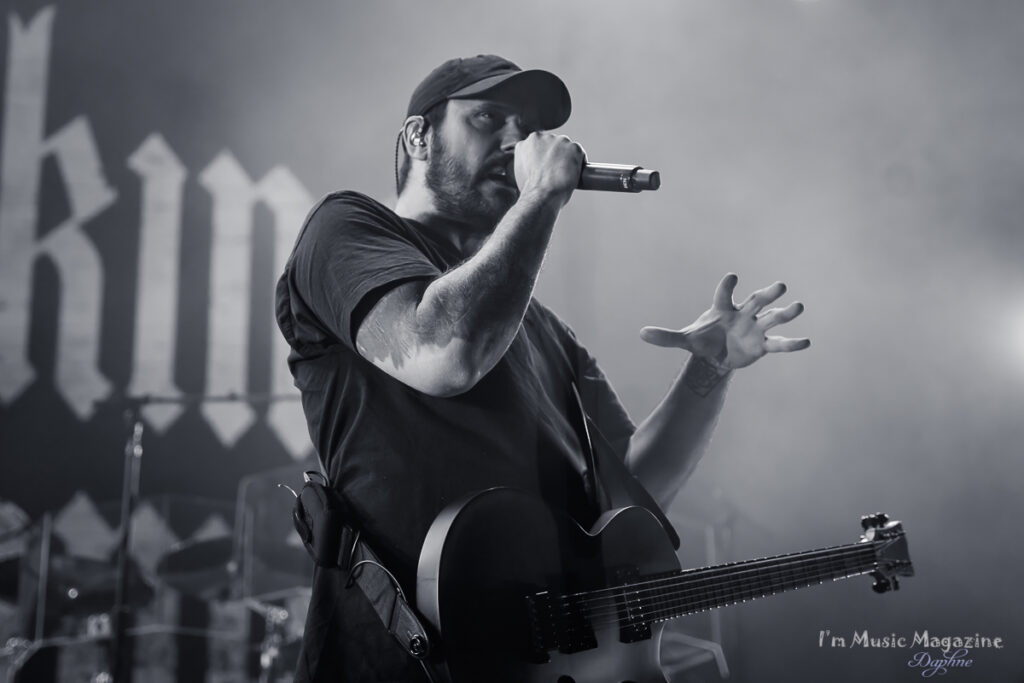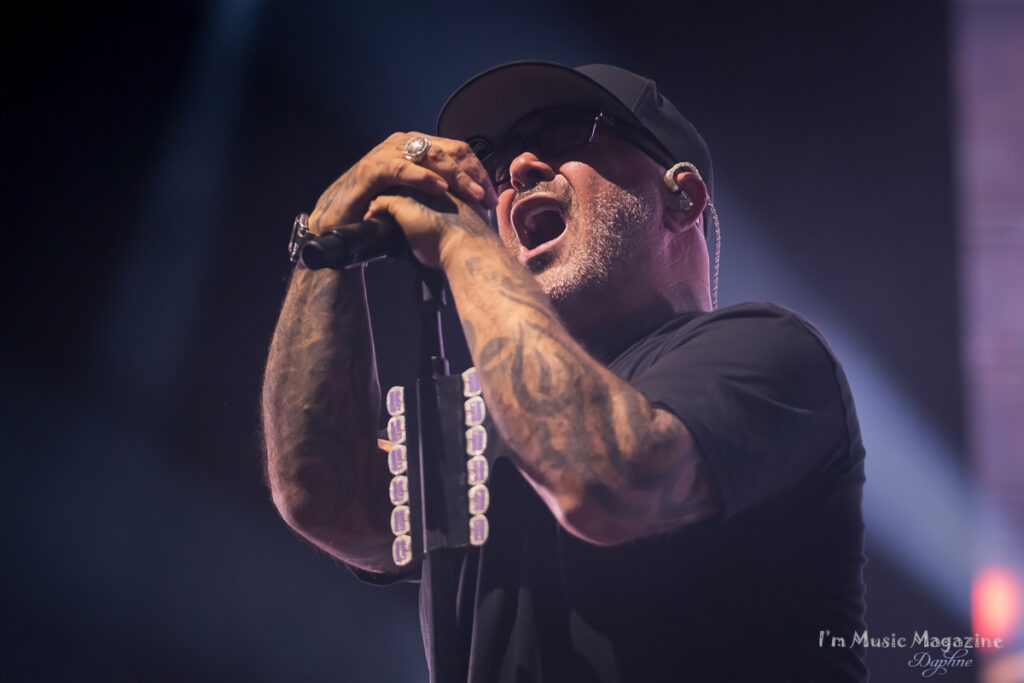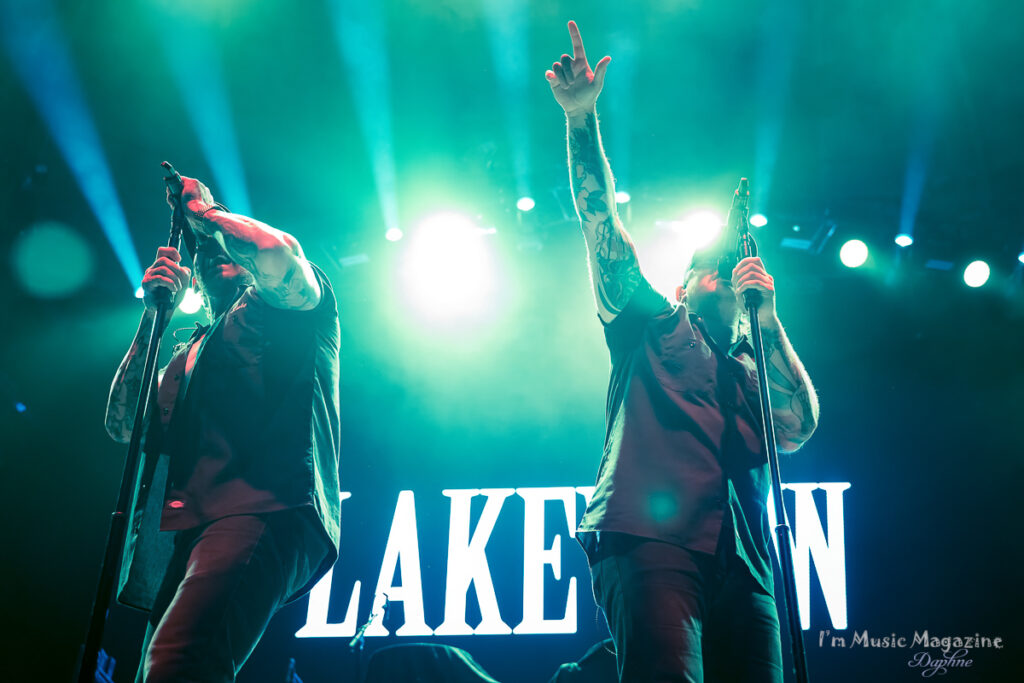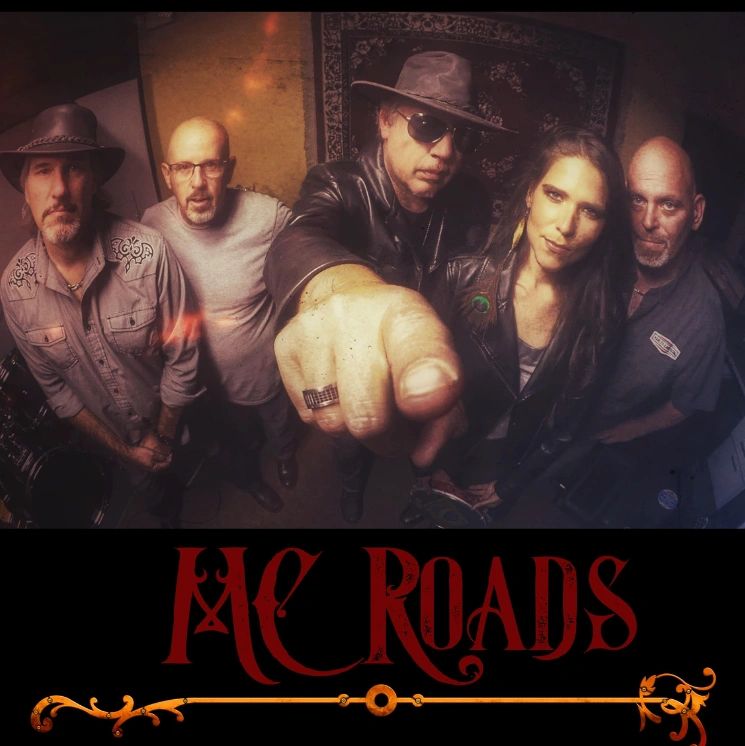
Hailing from Detroit Michigan, Mike Cross is the original founding guitarist for American rock act SPONGE. Now, Cross is the lead vocalist and guitarist for his new band MC Roads, who recently signed to Golden Robot Records. MC Roads offers up a powerful blend of melodic, guitar-driven music and classic style songs.
MC Roads released three singles ahead of the release their EP No Nostalgia on September 10: “Stoned in Love,” “Call It What You Want” and “Smile Like A Knife.” Originally recorded on 2-inch master tape, MC Roads‘ debut effort No Nostalgia on Golden Robot Records is a collection of classic style songs with a modern twist. With colorful lyrics and intense guitar-driven arrangements, these five songs weave a story that may at times feel a bit nostalgic, but then again, not.
As a co-writer for Sponge’s platinum selling album Rotting Piñata, sophomore album WaxEcstatic and third release New Pop Sunday, Mike Cross helped catapult the band into rock star status with his catchy hooks, iconic crunchy guitar and an undeniable original sound. The band toured extensively, headlining shows in the US and in Europe supporting “A” list artists such as Alice In Chains, KISS and Soundgarden. Mike also appeared on the late night talk show circuit including The Late Show with David Letterman, The Conan O’Brien Show and the Jon Stewart Show. After his departure from the band due to creative and business differences, he turned away from music business to focus on his personal life. However he continued to write, record and produce various music projects and develop his own vocal abilities. Through MC Roads, Mike Cross has created a unique, guitar driven and melodic sound that encapsulates an incredible mix of new and classic style songs.
We had a chance to sit down with the MC of MC Roads, Mr. Mike Cross himself to talk about all things MC Roads as well as the first album he ever bought and who his first celebrity crush was. Any guesses?
I’m Music Magazine: Hey Mike! A punctual rockstar; I like that.
MC Roads: I thought about calling you a little late, but you know, what’s the point.
I’m real curious to find out some stuff about you and about what you got going on and everything. Dude, ever since we got the first press release, I jumped on this. “Call It What You Want” was the first thing we got and I thought, ‘oh man, this is good.’
Hey, thank you!
You know what, I actually listened to the song before I read the story. Dude, I get so many emails each day and I try my best to open and read them and listen. So, I’m multitasking at the computer and I’ve got more windows open than I can keep up with, and I just remember hitting it and going, wait a minute, which damn window is this coming from?
I remember hearing it and it really caught my ear. Then I read the press release and I’m like, oh, he used to be in Sponge, that’s pretty cool. And then, I read everything and started doing a little bit of the research part. Have you released anything album wise since you left Sponge?
I’ve released nothing. Basically it was kind of like that part of my life at that point was over. Sponge was kinda like we did some good things, but, we could’ve done more, you know? I’ve always played music, but it was just, like the touring and that whole thing; I was just kinda like, okay, let me look at some other things. I didn’t intend to take that long of a break, that’s just, you know, kinda how it rolled out. I stayed busy; friends had asked me, can you help me write this, mostly local. I wasn’t like jumping out of planes, doing writing sessions or anything like that. I just basically lived a quiet life, you know.
So this COVID, it was just a weird thing. When COVID shut down everything, to me, it was all like the perfect opportunity? So that’s kinda how that went.
Wow!
I actually watched movies and this may sound like a little crazy, but, I watched this movie called “Searching for Sugar Man.” It’s about a Detroit song writer that wrote a bunch of songs. He kind of retired from the business because nothing happened with his music and come to find out, he’s like this big cult artist overseas. It’s just such an interesting story. It has such a profound effect. I mean, it was kinda like I had this group of songs I always thought, these songs are good and, but, do I want to go back in that world again? You know, do I want to do that? There’s plenty of ways to play music and stay creative and not be in a touring rock band. Not that there’s anything against it, I don’t think that at all, ‘cause we had some great times. But, watching that movie and then COVID, the world stopped enough for me, to where I was like, what am I doing? I mean, it’s getting late, you know, and if I’m gonna to do this, I’m gonna do it.
A few things have changed since the last time.
Right! Yes!
So, the songs that are on this EP. Were those things you were just kind of holding on to, or working on, thinking, you know, we’re going to do something with this sometimes, some how, some where?
Right. That’s exactly what it was. And you know, I went in the studio a while back and my intention was like, okay, so what, in my opinion everybody has opinions. So mine was just one. My view of my previous band is, we lost our way; creatively, musically, all that kind of stuff. And you know, when you’re kind of like out, like being on the road and being in a band like that, it’s kinda like shaking yourself in a jar. There’s all kinds of things going on. So I’m not like pointing any fingers or anything, but in terms of the vision I had for the band, just me personally. People get involved and things happen and all of a sudden, you know, you’re getting songs about drag queens, and you’re like, wait a second? How does that fit into the whole thing? But then you realize you’re only like one fourth of the decision making process. So as a creative partner; and by the way, I got nothing against drag queens, just so you know, nothing against it. But that’s the kind of thing your faced with. I bring my heart and soul to what I do creatively, you know, so it’s an all in process with me, and to unwind from something like that took a little bit longer than I expected. But getting back to the songs, that’s exactly how that went down. I said if I’m going to go back out, if I’m going to do a music project again, I’m going to make sure that the creative vision stays true, to the music. The only way I could figure out how to do that; many bands have figured that out, but, the only way I could sensibly, figure that out is if I was singing and I would write the music, you know what I’m saying? And so when I went and did thisthese initial recordings, it sounded to me recognizable. And that’s what I was looking for. Like, am I this kind of singer or that kind of singer, what I really want to be is somebody that you could recognize and say, Hey, that’s this guy, MC Roads, and did it fit the music. And I really do believe, we hit it on the head with these five songs. That also gives us a starting point so yeah, that’s how it went down.
Interesting, all right. Well, I’m a big music nerd. It comes from many, many, many years of being, just a huge music fan and working in music stores and stuff. I’m always curious about how an artist or band comes up with the name. So I know that I know where the MC comes from.
(chuckles) That’s more the most, man. I’ve had to explain it a couple of times.
Oh man, I can only imagine! So, Roads….is there a story behind that part of the MC Roads?
Yeah, so initially, I didn’t want to go, Hey, I got these songs, and I’m going to get a bunch of people to listen to what I say and it wasn’t going to be one of those things, you know? So I got with a group of musicians, one of which played on the demo. I played them these tunes, and they were like, man, these songs are great. You know, this is great. We can play them. So initially I was kinda like, okay, I got these original songs and I’m writing songs all the time. So maybe we’ll do some covers, you know, do some Wallflowers, some Tom Petty, you know, and I just mixed in these covers, you know? So that’s kinda how it started originally. Like, I’m just going to go play locally, you know, see what comes of it. I wasn’t looking for a record deal. Nothing like that. I was just kinda like, you’ll understand this; It was just totally for me. This is just what I’m doing, and, you know, if you like it cool, if not, that’s all right, too. But so, one of the guys that I was playing with at the time was like when we started talking about band names and one of the guys says, well, let’s call it Mike Crossroads, you know?
And so for me, like, I think about like all these great blues players around, you know. And this whole blues scene out there. And, you know, I would never want to impose myself as a blues guitar player. Cause there’s some like hardcore, really fricking good blues guitar players out there. I’m more a rock guitar player, but I went home that night from rehearsal, I was laying in bed. I’m like, MC Roads, you know? MC Roads. So to me, like I always liked band names, like, like a ZZ Top, right? Where, you know, it just sounded like a carnival sounded like a group, or like a game. It sounded like something, but it really didn’t sound like anything, you know? It didn’t put you in a place where it had to be this or that. The last thing I wanted to do before coming back out, was thinking I needed to be this or that. I needed the room to kind of grow and go where I wanted to go. So that, to me, was like, okay, MC Roads. That’s kind of like a little bit personal, like this is my road and then the roads thing kind of reminded me of, the road, you know. It reminded me of like motorcycles and fast cars and, and the MC thing was kind of like you know the leader of the band, so. Great question!
My other music nerd question, I ask these two and I tell them, I say, bear with me sometimes. I just want to make sure I got the story straight. The way I put it is, every hero and every villain has an origin, you know, and a band is no different. Except maybe radioactive spiders and government experiments. Other than that, you have an origin. I know you said you had worked with a lot of people at how, how did you choose the members that are in your band?
So that’s another great question. It’s kinda like, I made the decision, right. SoI’m going to go with it with a new project, you know? So oddly enough, it’s funny how this stuff works. So I’m looking for a piece of music equipment on Facebook Marketplace, right. And I come across this guy, he’s selling a studio desk and I just happen to need one. So I truck on over to his house, in Southwest Detroit. And I put a few musicians together, you know, drummers, a couple of guitar players come down and, you know, a bass player and stuff, but nobody really locked up, right? So, I pull up to this guy’s house and he’s got the studio desk, you know, out in his garage and, he’s a really nice guy, you know, and he says, well, I play guitar. And I’m like, yeah, I play guitar too. And he goes ‘You look familiar’ and of course the whole thing comes up; Yeah, I played in the band around here a long time ago. And he wants like $125 for this desk. And I go, man, will you take a hundred? He goes, you knew what the price was before you came over and, you know, I kind of pulled the desktop and everything and I’d be happy to put it back in my basement. You know, he was just so nice about it, I gave him 125! I’m like, okay, so this guy’s a guitar player and he’s nice. That’s, you know, that’s pretty cool. And so we exchanged numbers. He said he’s got his own project going and I go, look, I’m putting my project together. I always liked the sound of the two guitar players band. I got some recordings that are allocated to two guitar players. So a couple months go by, cause I’m still kind of just mingling with these guys that I’m thinking about doing a project with.
So I listened to his stuff and I go, okay, so he’s a real guitar player. He’s got a little blues flavor, a little bit of this, a little bit of that, but I know I was like, as soon as I heard him play, I was like, this is the guy I can, I can maybe, you know, develop that two guitar player sound with. So his name is Bobby G. So when he came into the fold, it was kind of, I don’t want to say partner, but it was kinda like, he listened to the music, he got it and he was way behind it, so we hit it off right away. And then, so then he knew a drummer that he had played with, you know, quite a bit. So we had him come down and he felt like a glove. His name is Dearl. Okay, then Rik Latta was the guy that originally played on the recordings with me. So I always saw the bass parts in those songs as part of the sound, quite intricate. So he was like the obvious choice. So he jumped on board and then, the last person was a background singer named KK. I needed that female vocal, to kind of top off stuff. A little bit more range and things like that. I always liked the Fleetwood Mac styles and, you know, when Tom Petty would have background female vocals, and Neil young, that that’s the kind of stuff I really listened to. I always heard this thing with a nice feminine style voice, above the top. So she called me up and I had put an ad out and she had never sang professionally. So I said, okay, well, now’s your chance. You need to sing me your three favorite songs over the phone, put you right on the spot? She did it! So then I invited her to the rehearsal. So, here’s this gal, she’s in her thirties or whatever. And she comes all the way across town and she’s in rehearsal with three, four other guys by herself, and she just kicked it. She showed up with like spandex pants and big white, rubber boots and feathers in her hair, you know, like she was just ready to go. I’m like, okay, we got somebody with fire and someone that’s been around awhile, so it’s kind of like a good day.
What she adds to these songs is really nice. I think it does adds a nice layer to them. Then I’m thinking, would I hear them and react the same way if that layer wasn’t there, you know?
That’s so nice of you to say and to point that out. That’s what makes it interesting for me, you know? And I think because I approached this, not so much like a singer, but I approach it like you were talking about being a music fan. I approach it like, what is it that I would want to hear? If I were out there looking for music today. There’s a lot of great singers out there. All these bands, they all got their own thing, but I wanted something that had little bit more dimension to where it gives us some room.
I wanted to be able to have that room. I don’t compare myself with artists like Neil Young or Tom Petty, because, they are legends, but those are the people I listened to. Just the song writer, craftsmen kind of people. I don’t compare myself, I sure try and do my best to be as good as I can be, you know, following in those kind of footsteps.
So the whole COVID thing. I don’t know if your musicians were local to you. I know, with everything being in lockdown mode and everything.Did that come into play with the recording? I know now that technology’s changed, you don’t even have to be in the same room anymore?
Yeah. So, only one of the people in my current touring band played on the record. I did a majority of the guitar work, but you bring up a good point. So that stuff was recorded on two inch tape, because that’s what I was used to, you know? And so when I decided to release this, I had to get into the digital world. And so, I went to a studio here in town and, we kinda mixed it on digital and everything like that. So that, COVID timeframe is about when I was doing the mixes. And about this time, same kind of thing I had an attorney on the west coast that was just gonna take these songs and try and find some distribution company, you know, because I was looking at the enormous task of putting it out myself, and I didn’t know how to do all that. I mean, I was kind of like looking into it. I figured I’m kind of computer savvy, so I can kind of do this. About that time is when, I ran across an artist on Golden Robot Records and they were on Facebook. And so I kinda checked them out. And I was like, okay, so these guys say they’re artists friendly and all their artists are like raving about how cool they are. I’m like, well, maybe I should just like send my songs to them. And they were still in demo stage, you know? And again, I wasn’t looking for a record deal. I was looking at putting it out myself. I got an email back from the CEO and founder, a few days later. It was kinda like I made the decision and these things started to fall into place.
We’ve done quite a bit of work with Golden Robot since we found out about them, with different artists on that label. So, yeah, that was cool when I read that you had found them. I thought cool! I know that label.
They’ve been great!
September 10th was the official release for the EP. I guess you had already released a couple of singles, before the EP was officially released. What do you hear and what are you feeling with the feedback getting to you?
I did an interview earlier today, and they were like crazy about it. They loved it, you know? I’m trying to stay on top of that, as well as, doing a lot of the social media, look around a lot of that. So the feedback I get is, is quite good. I haven’t heard anybody say, hey, I mean, I just don’t get this stuff. Now I know it’s not for everybody, but we’re also, realistically, I know that we’re still just one band, trying to build an audience, and we’re really starting from square one. Maybe I had something going, many, many years ago in a band, but it’s not like, I jumped out of that thing and then, you know, rode that somewhere else. That thing really had a pinnacle, on the first record and really had a hard time after the first record. So there wasn’t like a pleasant exit from the business. It was kinda like sliding down the slide, like, here I am, okay, this is great. Then it was like, boom, you know, clubs are getting smaller. All of a sudden there’s no record deal, all that kind of stuff.
So, I didn’t really have the opportunity to take that success and utilize it. But at the same time, I wanted to go out and kind of regain my own legacy. Because what happens is, other people start taking charge of the band and how they want it to come across and all of a sudden, it’s almost like I was never in the band. So that was part of it, you know, like, Hey, I had a lot to do with this band’s success, when it had it. I also want to go out there and do my own thing. So I kinda said, hey, I’m going to go and try and recapture just my place, if that makes sense. My place in what I’ve done in the past and kind of tie it to what I’m doing now.
Dude, I can only imagine. Anything on the trajectory coming up that you want to mention plug in here?
It’s very hard to book tours right now in this climate. So we’re trying to decide, does it make sense, to hold out on the tours, do we look at maybe releasing some additional music or maybe going back in the studio? There’s a whole lot of options. What we’re trying to do is just stay focused on promoting the EP to the best of our ability. You know, this is like, this is our opening shot, so we’re all hands on deck with that.
Mike, we always end these interviews was something that we call Three for the Road. It’s just three, just kind of fun questions that you’re normally not hit with. Do you remember your very first celebrity crush?
Celebrity crush? That had to be Maryann on Gilligan’s Island. Something, about her. You know, I don’t even remember how old I was, but I was just, wow, whoa. The stars were like in the cartoons all around my head. I’d get dizzy when she was on the tv.
Wasn’t it weird, she was supposed to be like the polar opposite of Ginger?
Yeah. So I guess something about me didn’t want the flashy.
A lot of people like Maryann though (chuckles)
I’m a Maryann kind of guy.
All right. Do you remember what the very first album was that you bought with your own money that you saved up?
Oh, what a great question, Johnny. I love this question. It was Cheap Trick Live at Budakon. So, what had happened is we had a music store that seemed like it was forever away, you know, it was, but it was only like a couple of miles. Back then, you know, all I had was a bike. So I’m in Michigan and I remember it was December. I had saved up money from a paper route and I had enough money to go to the record store. I had heard this song on one of the radio stations, “Surrender” and I thought, this is a great song. I love Cheap Trick to this day, what a great band. So, I’m going to go to the record store and I’m going to buy this album. So I go there and I bought the studio version. It’s not the same, I heard the live version, you know? I get home and I played it and I was like, that’s not, that’s not the song I heard. It sounded totally different, you know? I actually went back to the store and, I said, Hey, I think I bought the wrong album. And I don’t know, for whatever reason, they were just nice about it. Back then, they were like, oh, well, which one did you want? I’m like, is there a live version? They’re like, oh, you’re talking about Live at Budakon. So I had to pony up the extra dollar or whatever, because it was a little more expensive, but that taught me something. You don’t have to accept, you know. I made a mistake, so I went back when I corrected it and I bought Live at Budakon (chuckles)
That’s funny, man. Yeah, there’s a huge difference, between the recording of both of those songs.
There’s just so much energy in that Budakon “Surrender,” that whole album.
Last one. I’m having a hard time picking which last one to ask you, so I’m going to spin the wheel. All right. You’ve probably seen in movies or television shows when, when an actor or actress will have somebody else as their inner voice, talking for them. If you could have anybody and it can be cartoon character, real person, it doesn’t matter. If anybody could be your inner voice, who would you want it to be?
You know, I’m surprised at what popped in my head when I heard you say that. It just came quickly. So I’m just going to go with it. Tom Petty, he’s like the ultimate band leader, you know? Just his take on music and how he approached song writing. Wow, if I can have a guy like that, kind of guide me through, the decision making process. So I don’t know. That’s what came to mind right away.
That’s a cool one though, right. That wealth of knowledge and years and years of experience too. So that’s a great one. Cool. Well, Mike, I’ll wrap it up there. Hey, and one last thing real quick. It dawned on me as I was listening to the EP. I’m like, oh my God, I’ve actually, I saw you with Sponge. You didn’t leave the band till 2000, if my info was right. Do you remember the Tiger Stadium show with KISS?
Oh, well, yeah. How could I forget? I mean, it’s probably one of the biggest shows we ever did! Interestingly enough, it was, it was a show that we kinda got as a fluke, because Stone Temple Pilots were originally scheduled. I don’t remember what happened, but how we got that gig was Susan Silver, who was Soundgarden and Alice In Chains’ manager, actually had become our manager, recently on the second record with Columbia. It was kinda like, she had the connections and, you know, we were in Detroit; Stone Temple couldn’t do it. Boom. All of a sudden we’re on the bill. How excited were we? I mean our hometown, Tiger Stadium, KISS, and a band that I absolutely love, Alice in Chains, you know? So yeah, on the kind of sadder side of things, that was the last time I actually saw Lane (Staley) alive.
I’m Music Magazine Owner/Editor Johnny Price
Listen to/Download No Nostalgia here:
No Nostalgia – EP – MC Roads (smarturl.it)
